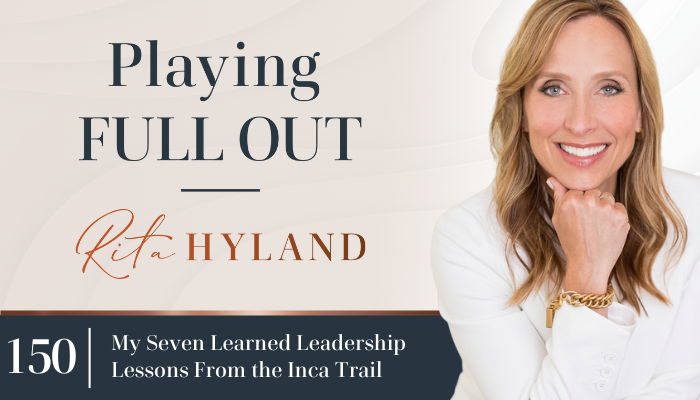My Seven Learned Leadership Lessons From the Inca Trail

Listen to the full podcast episode to learn about the science-backed practice that has not only changed my life but also the lives of countless people over the last two decades. This is something you can’t ignore if you want to achieve that great goal you identified for this year and write your new future.
There are moments in a leader’s life when a long-imagined milestone finally arrives…and instead of feeling ready, you feel your own expectations staring you down. That was the case for me as I stepped onto the Inca Trail, a 25-year dream suddenly becoming real, along with every doubt about whether I had trained “enough.”
What unfolded on that trail was not only a physical challenge but also shifted how I see myself, my leadership, and how I move through the world. In this episode, I’m sharing the seven insights I brought home that will resonate with any leader navigating pressure, responsibility, and the desire to lead with more clarity and intention.
Why This Journey Matters for Leadership Today
Leadership at the highest levels often happens in environments filled with noise, deadlines, decisions, expectations, and the constant pressure to anticipate what’s coming next. What the Inca Trail offered me was something leaders rarely get: uninterrupted reflection. No notifications, no meetings, no roles to perform, just miles of space where I could hear myself think without the usual filters.
When everything familiar falls away, you start to notice the beliefs that influence how you lead: the pace you default to, the responsibilities you quietly carry, the pressure you internalize, and the stories you tell yourself about what it means to be capable, prepared, or strong. The trail made those patterns visible in a way that everyday life never could.
That distance, literal and emotional, created a clarity I didn’t know I needed. It reminded me that perspective is a leadership tool, and that stepping outside your routine can reveal truths that don’t surface when you’re surrounded by urgency and obligation. This journey mattered because it reconnected me to a version of myself I don’t always access in the rhythm of daily leadership: grounded, aware, open, and deeply honest.
The Seven Leadership Lessons from the Inca Trail
- Kindness is a strategic advantage.
Before I even left home, I noticed the quiet pressure I was putting on myself to “perform”. I made myself a promise: no matter how the journey unfolded, I would meet myself with kindness. And something surprising happened. That decision changed everything: my mindset, my resilience, and my entire experience.
- Success looks different from the back of the pack.
Our guide insisted we stay at a steady pace. Watching others sprint ahead only to burn out reminded me that slowing down can help you see more, feel more, and lead more intentionally.
- Mutual support elevates everyone.
The Andean philosophy of ayni, “today for you, tomorrow for me,” showed me what leadership looks like when it’s rooted in reciprocity rather than competition.
- Presence is a form of leadership intelligence.
Asking “what’s next?” kept pulling me out of the moment in front of me. Letting go of that impulse sharpened my intuition and steadied my nervous system.
- Resilience is built one small step at a time.
On day two, the steep climb felt impossible until I focused on one step at a time. Then the next. Leadership resilience is built the same way.
- Awe recalibrates your sense of responsibility.
The sacredness of the mountains reminded me that leaders aren’t meant to carry everything alone. Perspective changes how we hold pressure.
- Growth expands everything you lead.
Every investment in yourself, big or small, creates a ripple effect across your relationships, leadership, and life. Growth is never just personal.
Aligned Leadership Comes From How You Walk, Not How Fast You Go
When I returned home, my husband noticed it instantly: I had changed. Not because I conquered a mountain, but because I rediscovered what leadership feels like when it’s rooted in awareness, kindness, and trust.
Leadership, like the Inca Trail, isn’t about getting to the summit first. It’s about how you walk the path, your presence, your pace, your self-trust, and your willingness to grow along the way.
In this episode, I share:
- Why leaders must slow their pace to see more clearly
- How mutual support strengthens teams more than output alone
- What ritual, nature, and presence teach us about grounded leadership
- Why lifelong growth is the most strategic leadership investment you can make
Resources and related episodes:
- Tune in to the previous episode, A 3-Question Practice To End Overthinking and Move Forward
- Listen to Ten Ways To Adjust Your Strategy and Rhythm For More Enjoyment This Season
- If you’d like to be notified of when new podcast episodes are released, you can do so here: Playing Full Out
- Learn more about the Inside Out Method
- Connect with Rita on LinkedIn
Subscribe on Apple Podcasts for more tips, tools, and inspiration to lead the optimal vision of your life, love, and leadership. Remember, a half version of you is not enough. The world needs the fullest version of you at play.
___
About Rita Hyland
With over 20 years of experience as an executive and leadership coach, Rita helps leaders — emerging and established — excel in corporate and entrepreneurial environments.
Rita believes if leaders were more clear about how transformation really works and more intentional about creating what they want, their impact, success, and influence in the world would be unstoppable.
Through her coaching programs, private coaching, and masterminds, Rita shows leaders how to win consistently and create the impact and legacy they desire.
Central to Rita’s work is the understanding that you will never outperform your current programming, no matter how strong your willpower.
When you learn to use Rita’s proprietary Inside Out Method, a technology that uses the best of neuroscience and transformational psychology to hit the brain’s buttons for change, YOU become both the solution and the strategy.
Her mission is to end talented, hard-working, and self-aware leaders spending another day stuck in self-doubt or confusion and not contributing their brilliant work and talent the world so desperately needs.



Leave a Reply
Want to join the discussion?Feel free to contribute!